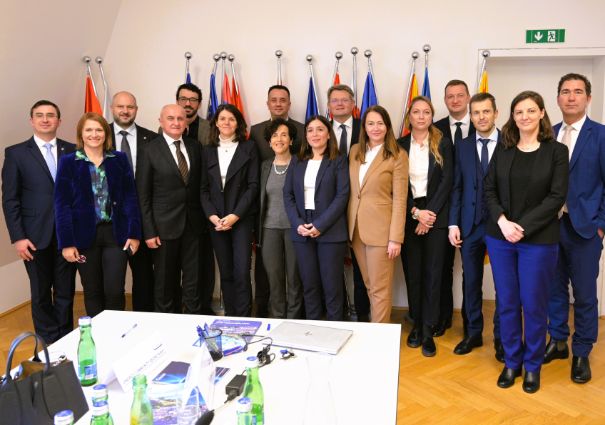The Ministerial Council is the institution representing the governments of the Parties to the Energy Community Treaty. The Council is the highest decision-making body of the Energy Community. It convenes at least once a year.
-
Tasks
Tasks
The key task of the Ministerial Council is to ensure that the objectives set out in the Treaty establishing the Energy Community are attained. The Council:
- adopts new laws and decides on the Energy Community’s overall direction and priorities;
- approves the Secretariat's budget and work programme;
- adopts Procedural Acts, which may include the conferral of specific tasks and powers to carry out Energy Community policy on the other institutions.
It is also the Ministerial Council that decides on the accession of new Observers or Contracting Parties to the Treaty.
-
Composition
Composition
The Ministerial Council brings together government ministers responsible for energy from each Energy Community Contracting Party and the European Union, usually represented by the European Commissioner for Energy and a high-level representative of the Presidency of the Council of the European Union.
-

- 21st Ministerial Council, 14 December 2023
-
-
Presidency
Presidency
The Presidency of the Ministerial Council rotates among each Contracting Party every twelve months. The Presidency can convene the Ministerial Council in a place of its choice. Generally, this has been the capital of the country holding the Presidency. The Presidency chairs the Ministerial Council and prepares its agenda. In this role, it is assisted by the European Union and the incoming Presidency as Vice-Presidents.
For the period from 1 January to 31 December 2024, Bosnia and Herzegovina holds the Presidency in Office of the Energy Community.
-
Decision-making process
Decision-making process
In the Energy Community, each Party to the Treaty has one vote.
Whilst decisions are generally taken by consensus, the majority required to adopt a proposal depends on the Treaty base under which the measure was proposed.
Measures under Title II: Decision taking procedure: Extension of the acquis communautaire shall be taken by a majority of the votes cast only on the ground of a proposal from the European Commission, which may alter or withdraw its proposal at any time before the final adoption of the measure. Measures under Title III: Decision taking procedure: Mechanism for operation of network energy markets shall be taken by a two third majority of the votes cast, including a positive vote of the European Community, upon a proposal from a Party or the Secretariat, which shall also take account of a position of the Regulatory Board. Measures under Title IV: Decision taking procedure: The creation of a single energy market may be taken on a proposal from a Party only by unanimity. The European Commission on its own request or upon request of any Party, might request a position of the Regulatory Board. A Decision adopted by the Ministerial Council is legally binding in its entirety upon those to whom it is addressed.
A Recommendation has no binding force. However, Parties shall use their best endeavours to carry out the Recommendation.
